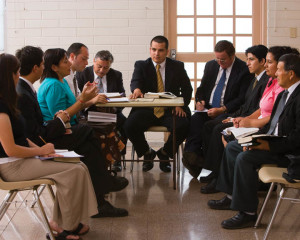Ask anyone what it means to gossip and they can give you an answer. What I am shooting for today is an understanding of gossiping that goes beyond the definition of repeating “dirt” about someone out of turn. To help me in this quest I have enlisted the help of numerous apostles and prophets by raiding the conference section of LDS.org.
Is it just dirt?
In one sense, gossiping is the act of sharing information that is not your right to share. (Did you hear that …) It includes the sharing of information that may be good, as well as bad about someone. (I just heard that the new RS President is going to be …) If it is inappropriate that you are discussing it at all then it falls under the category of gossip. (I know that John has been struggling with his addiction …)
 The problem with gossip is that we can slip into gossip mode so easily and quickly. We may even mean well in what we say. (Yes, I have noticed how long it takes for Bishop Todd to extend callings …) Elder L. Tom Perry once included this piece of advice in a list of things we should consider: “… never speak ill or gossip about your bishop or his family. Respect this great and important calling.”
The problem with gossip is that we can slip into gossip mode so easily and quickly. We may even mean well in what we say. (Yes, I have noticed how long it takes for Bishop Todd to extend callings …) Elder L. Tom Perry once included this piece of advice in a list of things we should consider: “… never speak ill or gossip about your bishop or his family. Respect this great and important calling.”
Gossip is more than just social “dirt” on someone. Gossiping embodies all the qualities of soul that are opposed to the spirit of charity, the spirit of love. Gossip only hurts. There is no such thing as gossiping that is meant to benefit and build up. All gossip embodies the spirit of degradation, judgment, and condemnation.
President Dieter F. Uchtdorf has asked this question: “Do you gossip, even when what you say may be true?” The answer is yes, you can gossip even when the information is true. What makes it gossip is the spirit with which the statement is made.
Gossiping is a form of judgment
When we make any statement that passes judgment on someone or their actions or attitudes, we have crossed the line from charity into gossip. Here is a famous quote from President Uchtdorf:
This topic of judging others could actually be taught in a two-word sermon. When it comes to hating, gossiping, ignoring, ridiculing, holding grudges, or wanting to cause harm, please apply the following:
Stop it!
Spreading ignorance
Gossip includes those pieces of information that tend to be sensational in some way. As part of my own personal bias I will refer to these stories and comments made over the pulpit as the stories from Mormon urban myths. These stories are often faith promoting rumors that cause the congregation or class to gasp at the wonder of the miracles performed in someone’s life. Problem is, the stories often are not true. The information was passed on in ignorance because someone wasn’t willing to search out the source of the story for themselves before passing it along to others. It was just too sensational to not use.
In passing along such bits of “doctrine” and sensationalism we do more damage in the long run than good to someone’s testimony.
President Harold B. Lee stated:
There are some as wolves among us. By that, I mean some who profess membership in this church who are not sparing the flock. And among our own membership, men are arising speaking perverse things. Now perverse means diverting from the right or correct, and being obstinate in the wrong, willfully, in order to draw the weak and unwary members of the Church away after them. …
I should like now to make reference to some of these. The first is the spread of rumor and gossip (we have mentioned this before) which, when once started, gains momentum as each telling becomes more fanciful, until unwittingly those who wish to dwell on the sensational repeat them in firesides, in classes, in Relief Society gatherings and priesthood quorum classes without first verifying the source before becoming a party to causing speculation and discussions that steal time away from the things that would be profitable and beneficial and enlightening to their souls.
Have you ever thought of that? By passing along bits of information or stories that you have not verified to be true, and that are actually beneficial for others to know, you do more harm to the testimony of others than you do good.
The judgment of gossip
Sometimes even when our friends are accused of wrongdoing or gossip is started about them, we disloyally accept and repeat what we hear without knowing all the facts. It is sad indeed that sometimes friendships are destroyed and enmity created on the basis of misinformation.
If there be one place in life where the attitude of the agnostic is acceptable, it is in this matter of judging. It is the courage to say, “I don’t know. I am waiting for further evidence. I must hear both sides of the question.”
Only by suspending judgment do we exhibit real charity. It is hard to understand why we are ready to condemn our neighbors and our friends on circumstantial evidence while we are all so determined to see that every criminal has a fair and open trial. Surely we can try to eliminate pride, passion, personal feeling, prejudice, and pettiness from our minds, and show charity to those around us.
Gossip is the worst form of judging. The tongue is the most dangerous, destructive, and deadly weapon available to man. A vicious tongue can ruin the reputation and even the future of the one attacked. Insidious attacks against one’s reputation, loathsome innuendoes, half-lies about an individual are as deadly as those insect parasites that kill the heart and life of a mighty oak. They are so stealthy and cowardly that one cannot guard against them. As someone has said, “It is easier to dodge an elephant than a microbe.”
The question is why
 Gossip is damaging. It is judgmental. The purpose of gossiping is to gain attention, to hurt another, or look like we are more knowledgeable than we really are. Gossip also happens because we lack judgment. We repeat information that is not ours to repeat. We pass along information that is not verified or is said for any reason other than with the intent to build up and love another person.
Gossip is damaging. It is judgmental. The purpose of gossiping is to gain attention, to hurt another, or look like we are more knowledgeable than we really are. Gossip also happens because we lack judgment. We repeat information that is not ours to repeat. We pass along information that is not verified or is said for any reason other than with the intent to build up and love another person.
What makes gossip so insidious is that most of us get trapped in gossiping without even realizing we are doing it. We are making an observation that, if we stopped to think about it, probably shouldn’t have been made because it wasn’t very charitable in nature. But we fool ourselves by telling ourselves that what we said, after all, was the truth.
We often make comments without giving the person about whom we are commenting the benefit of the doubt. We often don’t have all the facts, yet we are still making statements, almost as if they are the facts.
Elder N. Eldon Tanner related a story about Sister McKay. The principal in the story made a comment about a boy in her new class that was probably true up to that point. He may have felt he had the information on good authority. The story the principal knew may have been absolutely true. What made it gossip is that it tore down the reputation of the boy and hurt him socially and emotionally. It was the quick thinking of Sister McKay that prevented that damage from causing further harm.
There is a little story about Sister McKay, the wife of President David O. McKay, when she began teaching school. As the principal introduced her to the class, he pointed to a certain boy and said he was a troublemaker. She sensed the boy’s embarrassment and feared he would live up to his reputation, so she wrote a note and slipped it to him as she passed his desk. It said, “Earl, I think the principal was mistaken about your being a bad boy. I trust you, and know that you are going to help me make this room the best in the school.” Earl not only became a paragon of scholastic virtue but also one of the town’s most important people.
Elder Tanner goes on in his talk to say:
If we could accept and practice the second great commandment, “Thou shall love thy neighbor as thyself” (Matt. 22:39), and really learn to love our neighbors, there would be no vicious gossip or bearing false witness. In the Lord’s Prayer, we have these words: “And forgive us our debts, as we forgive our debtors,” and then he says: “For if ye forgive men their trespasses, your heavenly Father will also forgive you: But if ye forgive not men their trespasses, neither will your Father forgive your trespasses.” (Matt. 6:12, 14–15.)
 Gossiping is the spirit of fault finding, which is at epidemic proportions in our society today. It does us no good to try to justify our desire to find fault with something. All it does is awaken within us a spirit of judgment and condemnation that drives away the Spirit and slowly eats away at our spirituality. Finding fault with the Brethren, your Bishop, Stake President, the Relief Society President, your quorum leaders, your home or visiting teachers, or neighbors will only serve to drive away your personal happiness. Here is a message from Elder Marvin J. Ashton about the dangers of fault finding.
Gossiping is the spirit of fault finding, which is at epidemic proportions in our society today. It does us no good to try to justify our desire to find fault with something. All it does is awaken within us a spirit of judgment and condemnation that drives away the Spirit and slowly eats away at our spirituality. Finding fault with the Brethren, your Bishop, Stake President, the Relief Society President, your quorum leaders, your home or visiting teachers, or neighbors will only serve to drive away your personal happiness. Here is a message from Elder Marvin J. Ashton about the dangers of fault finding.
I am acquainted with a wife and mother who is chained securely at the present time to a life-style of murmuring and criticism. She is the first to point out faults in her husband or to repeat neighborhood gossip. How damaging is a habit that permits fault-finding, character assassination, and the sharing of malicious rumors! Gossip and caustic comments often create chains of contention. These chains may appear to be very small, but what misery and woe they can cause!
“O that ye would awake; awake from a deep sleep, yea, even from the sleep of hell, and shake off the awful chains by which ye are bound, which are the chains which bind the children of men, that they are carried away captive down to the eternal gulf of misery and woe” (2 Ne. 1:13).
Final Thoughts
We will be judged by our actions, which are a result of our words and thoughts. Learning to control our tongues and thoughts is difficult. To control them means we must learn to monitor them and learn to weigh the merits of what we think and say before we let it loose in public.
When we make a comment about a situation we need to learn to make only those comments that will represent the love of God in us. Elder M. Russell Ballard made this comment:
In recent years there has been a rash of articles, books, and films written about women and girls who gossip and who are “mean.” Satan is always attempting to undermine the most precious element of a woman’s divine nature—the nature to nurture.
Nurturing words are words that heal, uplift and support. Nurturing words are the words of Christ. They are spoken only when needed, only when correct (not hearsay), and they are always meant to create more good than is currently in the conversation. Nurturing words help people feel like they are emotionally, socially, and physically safe. These are the kinds of things Christ would pass along in a conversation.

To read more of Kelly Merrill’s articles, click here.
How we learn to do that is not easy. But we can learn to speak like Christ. To start with, we may have to put a bridle on our tongue and refrain from chiming in on conversations with opinions until we have concluded that our comments are helpful and come from a place of love. If not then it would be better to remain silent.
The Spirit will teach us how to weed the spirit of gossip from our lives. We just need to make ourselves aware of its presence, and work to tame our tongues.
About Kelly P. Merrill
Kelly Merrill is semi retired and writes for https://gospelstudy.us. He lives with his wife in Idaho. His strength is being able to take difficult to understand subjects and break them down into understandable parts. He delights in writing about the gospel of Christ. Writing about the gospel is his personal missionary work to the members of the Church and to those of other faiths who are wanting to know more about Christ's gospel and His Church.






